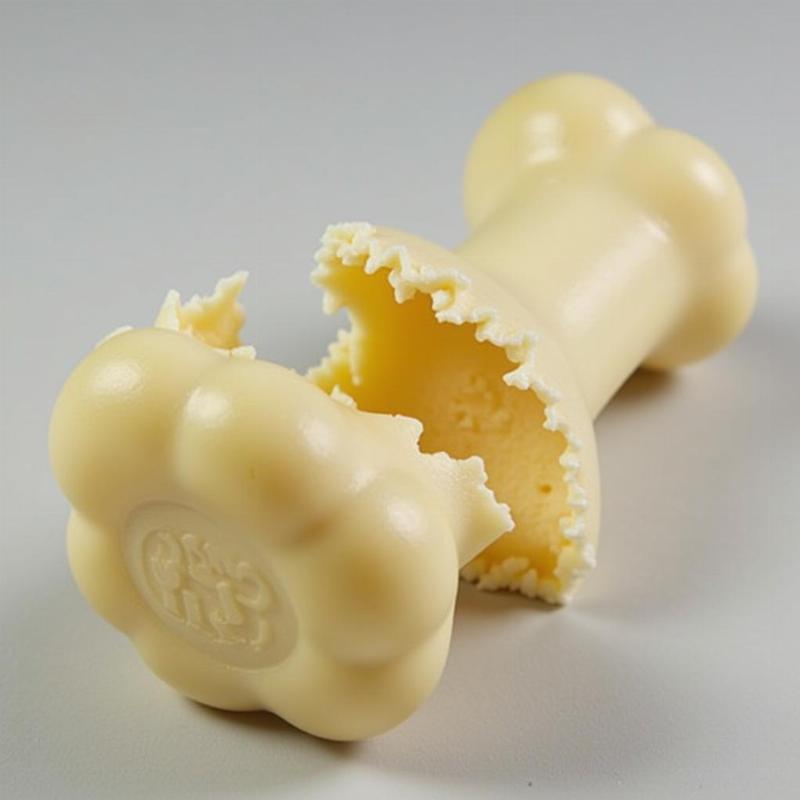Nylon bones are a popular chew toy for dogs, offering a seemingly durable and long-lasting alternative to natural bones. But are they truly safe and beneficial for our furry friends? This is a question many dog owners in the US grapple with, and understanding the potential risks and benefits of nylon bones is crucial for responsible pet ownership.
Understanding the Appeal and Risks of Nylon Bones
Nylon bones are attractive to dog owners for several reasons. They are durable, relatively inexpensive, and come in various shapes and sizes. This makes them a convenient choice for busy pet parents looking to keep their dogs entertained and satisfied. However, the durability of nylon bones can also pose a significant risk.
As dogs chew on these bones, small pieces can break off and be swallowed. These fragments can cause choking hazards, gastrointestinal blockages, or even perforations. Furthermore, the abrasive nature of nylon can wear down a dog’s teeth, potentially leading to dental problems down the line.
The Potential Dangers of Splintering and Blockages
One of the most significant dangers associated with nylon bones is the risk of splintering. Unlike natural bones that gradually break down, nylon bones can fracture into sharp, jagged pieces. These splinters can become lodged in the dog’s throat, esophagus, stomach, or intestines, leading to serious health complications.  Broken nylon bone
Broken nylon bone
If your dog ingests a large piece of nylon bone, it can cause a blockage in their digestive tract. Symptoms of a blockage can include vomiting, diarrhea, loss of appetite, and lethargy. If you suspect your dog has a blockage, it is crucial to seek immediate veterinary attention.
Safer Alternatives to Nylon Bones for Your Dog
Fortunately, there are many safer alternatives to nylon bones available in the US market. These include:
- Natural rubber toys: Durable and flexible, these toys offer a satisfying chew without the risk of splintering.
- Rope toys: Great for playing tug-of-war and satisfying a dog’s natural chewing instincts.
- Treat-dispensing toys: These toys keep dogs entertained and mentally stimulated while providing a healthy reward.
- Chews made from natural materials: Antlers, bully sticks, and other natural chews offer a safer and more digestible option for dogs.
dog chews for large dogs Finding the right chew for your dog depends on their size, breed, and chewing habits.
Are Knee Bones Safe for Dogs? A Veterinarian’s Perspective
“While nylon bones might seem like a durable option, the potential for splintering and internal damage makes them a risky choice,” says Dr. Emily Carter, DVM, a veterinary specialist in canine health. “I recommend opting for natural chews or toys made from durable rubber or rope. These options offer a safer and more enjoyable chewing experience for your dog.” is styrofoam bad for dogs It’s always important to consider the safety of materials your dog might ingest.
Recognizing the Signs of a Problem
It’s essential to monitor your dog closely when they are chewing on any toy or treat. If you notice any signs of distress, such as excessive drooling, gagging, vomiting, or changes in bowel movements, it’s crucial to take them to the veterinarian immediately. best dog collars for french bulldogs While considering chew toys, also ensure your dog has a comfortable and safe collar.
Conclusion: Prioritizing Your Dog’s Safety
While nylon bones may seem appealing, the potential risks associated with their use outweigh the benefits. By choosing safer alternatives and monitoring your dog’s chewing habits, you can ensure they enjoy a happy and healthy life. Are nylon bones bad for dogs? The evidence suggests that they can pose significant risks. Prioritize your dog’s safety by selecting appropriate and safe chew toys.
FAQ
- Are all nylon bones bad for dogs? While some nylon bones may be marketed as safer than others, the general consensus is that the risk of splintering and ingestion makes them a less-than-ideal choice.
- What should I do if my dog swallows a piece of nylon bone? Contact your veterinarian immediately.
- What are some signs my dog is having trouble with a nylon bone? Look for excessive drooling, gagging, vomiting, changes in bowel movements, or lethargy.
- Are there any safe alternatives to nylon bones? Yes, there are many safe and enjoyable alternatives such as natural rubber toys, rope toys, treat-dispensing toys, and chews made from natural materials.
- How can I tell if a chew toy is safe for my dog? Look for toys made from durable, non-toxic materials that are appropriate for your dog’s size and chewing habits. Consult with your veterinarian for recommendations.
- My dog loves to chew. What can I do to keep them entertained without nylon bones? Provide a variety of safe chew toys and rotate them regularly to keep your dog engaged.
- How can I encourage my dog to chew on safe toys instead of nylon bones? Make the safe toys more appealing by stuffing them with treats or playing interactive games with them.
are knee bones safe for dogs
funny dog toys for large dogs
Beautdogs.us is your premier online resource for all things dog-related in the US. We offer expert advice on dog breeds, care, and the latest products to ensure your canine companion lives a happy, healthy life. Whether you’re a seasoned dog owner or just starting your journey, Beautdogs.us provides authoritative and engaging content to support your every need. Contact us for more information at [email protected] or call us at +1 501-555-7529. Let Beautdogs.us help you navigate the world of canine companionship!